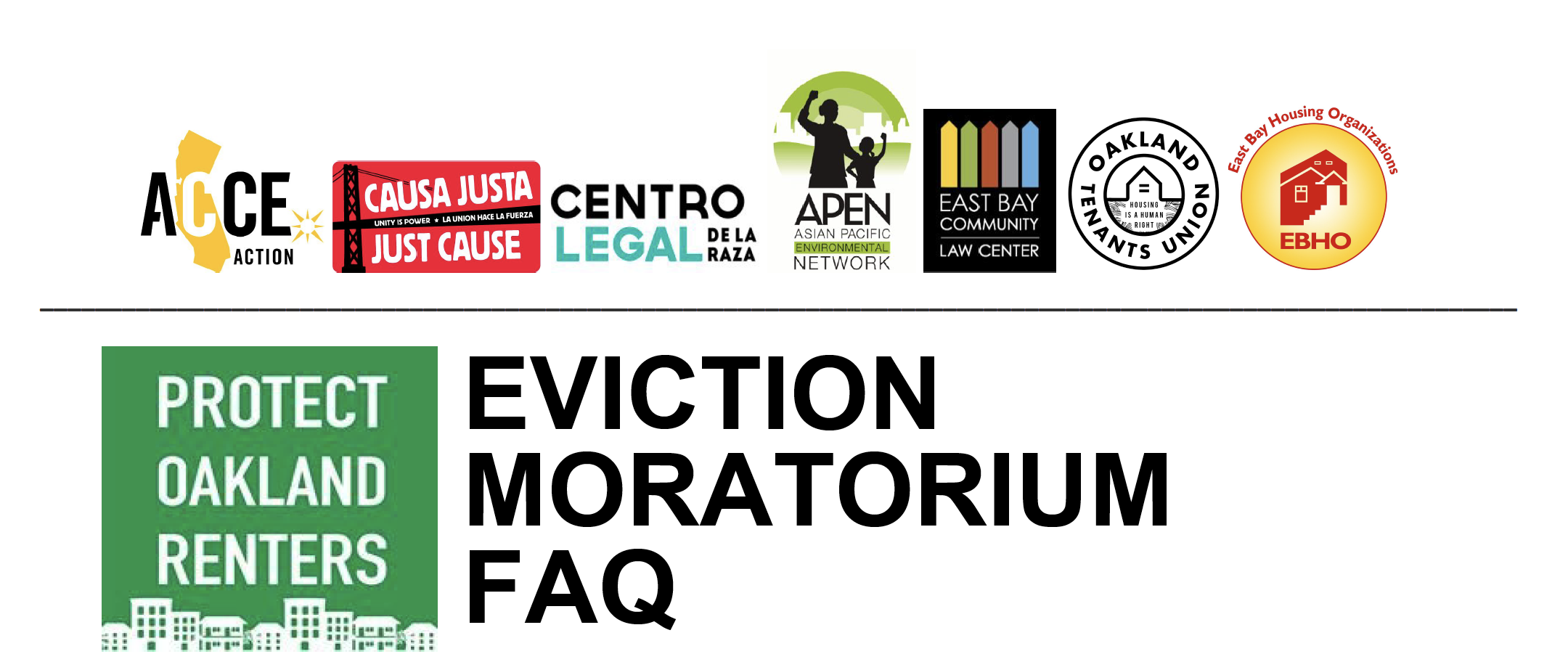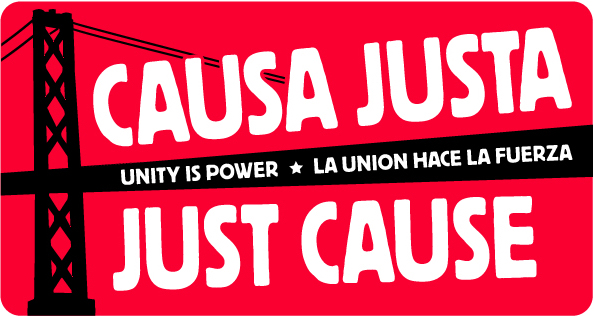
What is the Oakland Evictions Moratorium?
The Oakland Moratorium is currently the only real moratorium on evictions in the state of California. Here’s
an overview of what it does:
1) It protects Oakland tenants from being evicted during the Oakland State of Emergency for nearly every
reason.
2) Even after the State of Emergency ends, it protects Oakland tenants financially impacted by the
COVID-19 crisis from being evicted because they were unable to pay rent during the emergency period. It
also prohibits charging late fees associated with the back rent.
3) It limits certain rent increases during the State of Emergency.
4) It also protects small businesses and nonprofits who were financially impacted by the COVID-19 crisis
against being evicted for failure to pay rent.
Who Does the Oakland Moratorium Apply to?
The moratorium applies to all tenants in the City of Oakland who are covered by Oakland’s Just Cause for Eviction Ordinance. This mean all tenants, unless one of the following applies to you:
● The building you live in was constructed in 1996 or later
● You live in the same unit as your landlord (you share a bathroom or kitchen)
● You live in a health facility, nonprofit substance abuse treatment facility, or certain short-term
housing for homeless people
If I Live in a Single Family Home, Does the Moratorium Apply to Me?
As long as you do not fall into one of the exceptions above, the moratorium covers you. For example, if
you live in a single family home and your landlord lives there too then the moratorium does not apply to
your tenancy. There is no special exception for single family homes.
How Does the Evictions Moratorium Work?
1) A Ban on Almost All Evictions
The evictions moratorium says that if your landlord gives you an eviction notice during the State of
Emergency, that notice is legally invalid. If your landlord gave you an eviction notice prior to the State of
Emergency that had not yet expired (for example, the notice was for 60 days, but the 60 days had not run
out yet), that notice is also legally invalid. If your landlord filed an eviction lawsuit against you during the
emergency period, it is also invalid.
In any of the above cases, if your landlord then files an eviction lawsuit against you, you still need to take
steps to respond to the lawsuit in time. If you do, you can easily win the lawsuit without having to produce
evidence or get into facts of the case. Ideally your landlord will not file a lawsuit they can’t win.
2) Protection Against Future Evictions for Nonpayment of Rent
The law also protects against many future evictions for nonpayment of rent. If you are unable to pay rent
during the State of Emergency, and it is because of COVID-19 or some situation caused by COVID-19,
you are protected from being evicted in the future for failure to pay that rent. You are protected from any
late fees, as well.
In Oakland, in order to access those protections, you are not legally required to notify your landlord that
you are impacted by COVID-19 or provide them with proof right now. However, you may wish to send
some kind of notification to your landlord about your rent payments.
You should also collect and keep proof that you were financially impacted by the COVID-19 crisis so that if your landlord ever tries to evict you later on, you can present that proof in court. If at that time you prove that you couldn’t pay rent because of COVID-19, you will win the eviction lawsuit. You will still owe that rent in the future, but you can’t be evicted for failing to pay it, even after the emergency period ends.
Why Doesn’t the Ordinance Stop a Landlord from Filing an Eviction Lawsuit?
Under state law, if your landlord files an eviction lawsuit against you, even if the lawsuit is not for a legally
valid reason, you still have to respond in order to protect your rights. Unfortunately, no individual city can
pass a law that says otherwise. (The governor can do that, but he hasn’t.)
How Long Does the Eviction Moratorium Last?
The blanket ban on almost all evictions is retroactive to March 9. The moratorium has been extended until Oakland City Council ends the local state of emergency. We anticipate the moratorium to last until at least the beginning of next year.
The future protection for tenants related to nonpayment of rent does not expire. If you cannot pay rent
accrued during the State of Emergency and it was because of COVID-19, your landlord cannot ever
lawfully evict you for not paying. You will still owe that money, but you can’t be displaced from your home
because of it.
What Types of Evictions Does the Moratorium Cover?
The blanket moratorium applies if you are being evicted for any of these reasons:
● Nonpayment of rent
● Breach of lease (noncompliance with the terms of the lease)
● Refusing to sign a new lease with materially similar terms
● Causing substantial damage to the premises
● Disturbing quiet enjoyment
● Denying the landlord access to the unit if required by law
● Owner move-in
● Eviction for substantial repairs
The only two exceptions to the blanket moratorium are:
1) If you are being evicted under the Ellis Act (removing the whole property from the rental market for
10 years) OR
2) The eviction is because the tenant is an imminent health or safety risk to other occupants.
There are also extra protections for nonpayment evictions in the future.
I Can’t Pay Rent Right Now – How Does the Moratorium Work for Me?
The moratorium protects you in two ways. First, your landlord can’t legally give you an eviction notice right
now for almost any reason – including failure to pay rent. And second, even after the State of Emergency
ends, your landlord could try to evict you for not paying the rent accrued during the emergency period, but
if you can show that you couldn’t pay because of the COVID-19 crisis, you can win that lawsuit.
Your landlord can sue for the rent in other forums– for example, in small claims court. However, you
cannot lose your housing.
Whether or not you pay rent right now is a personal matter that depends on what choices and resources
you and your family have available to you. You may want to ask your landlord if you can pay a reduced
amount of rent during the crisis if you still have some income.
What Kind of Proof Do I Need to Show That I Can’t Pay Rent Because of COVID-19?
The law suggests some types of proof, but it doesn’t limit you to those options. You could use pay stubs, a
letter from your current or former employer, a letter from your child’s school, or medical records. If none of
those are an option for you, you could have a friend or coworker testify in court.
What Does the Law Do About Rent Increases?
The law limits rent increases for rent-controlled tenants. If your tenancy is covered by Oakland’s rent
control ordinance, then during the emergency period your landlord cannot give you a rent increase of more
than Oakland’s yearly CPI increase. Currently, that amount is 3.5%. The only exception is if your landlord
petitions the Oakland Rent Board for a “fair return”.
Ordinarily there are ways a landlord might be able to increase your rent above that amount – like banking
prior increases or capital improvements. This moratorium disallows those types of increases.
How can We Limit Rent Increases For Everyone?
Repeal the Costa-Hawkins Rental Housing Act.
Did Governor Newsom Pass an Eviction Moratorium in California?
Governor Newsom did not issue an eviction moratorium. On March 27, he issued an order on evictions
that we think is deeply unhelpful to tenants. His order changed some procedural court guidelines in some
eviction cases if tenants take affirmative steps now and provide information to their landlords. The order
does not extend the time for any tenant to pay rent or make them more likely to win an eviction case.
We think the order is functionally useless, and it is certainly not a moratorium.
What is Protect Oakland Renters?
Protect Oakland Renters is a group of community organizations that advocated, organized, and lobbied for
the Oakland Moratorium. It includes the Alliance of Californians for Community Empowerment (ACCE),
Causa Justa :: Just Cause, Centro Legal de la Raza, Asian Pacific Environmental Network (APEN), Oakland
Tenants Union, the East Bay Community Law Center, and East Bay Housing Organizations (EBHO).
Which City Officials Supported the Oakland Evictions Moratorium?
The Oakland Moratorium was originally sponsored by Councilmembers Nikki Fortunato Bas and Dan Kalb
and co-sponsored by Oakland City Attorney Barbara Parker. It passed Council by a unanimous vote.
Who Can I Contact in Oakland for Help If My Landlord Is Still Trying to Evict Me?
Legal Help:
Centro Legal de la Raza – (510) 437-1554
East Bay Community Law Center – (510) 548-4040, ext. 629
Eviction Defense Center – (510) 452-4541
Bay Area Legal Aid – (510) 250-5257
Legal Assistance for Seniors – (510) 832-3040
Asian Pacific Islander Legal Outreach – (510) 251-2846
Non-legal Tenant Support:
Causa Justa Just Cause – Tenant Hotline: (510) TENANTS (836-2687) (general advice for tenants in
English & Spanish); (510) 763-5877 (main number, tenant organizing)
Alliance of Californians for Community Empowerment – (510) 269-4692 (tenant organizing)
Oakland Tenants Union – (510) 704-5276 (tenant counseling)

